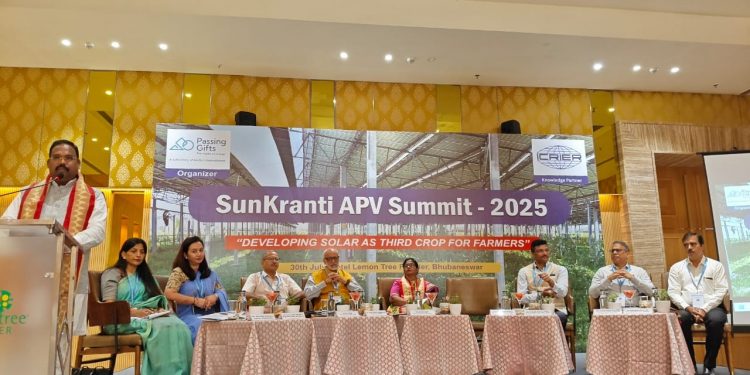Koraput: In a major step toward blending clean energy with agriculture, Odisha hosted its first state-level summit on Agri-Photovoltaics (APV) Wednesday.
The event brought together policymakers, researchers, farmers, and industry leaders to explore solar-powered farming solutions.
Organised by Passing Gifts, a subsidiary of Heifer International, the summit, SunKranti APV 2025, was held in Bhubaneswar and signalled a fresh push for sustainable rural development in the state.
Agri-Photovoltaics (APV) is an innovative model that enables solar panels to be installed above farmland, allowing farmers to generate clean energy while growing crops.
Also Read: Concerns mount over illegal migrant settlements
This dual-use system creates a “third crop” in the form of solar income, which experts believe can significantly boost the earnings of smallholder farmers, who constitute over 80 per cent of India’s agricultural workforce.
A major highlight of the summit was the launch of Odisha’s first community-led Agri-Photovoltaic (APV) pilot in Koraput, developed with technical support from ICRIER.
The initiative aims to empower tribal smallholder farmers by integrating clean energy generation with traditional farming practices.
The summit highlighted Odisha’s strong potential for scaling Agri-Photovoltaics, citing over 300 sunny days a year, an average solar irradiance of 5.3 kWh/m²/day, and a renewable energy capacity of 2,938 MW, 21 per cent of which is solar.
The state aims to expand this to 7.5 GW of solar capacity by 2030.
Speaking as chief guest, Assembly Speaker Surama Padhy praised APV’s potential to transform rural livelihoods.
“Agro-Photovoltaics may be a new term, but the concept is powerful and adaptable.
It must be aligned with schemes like PM-KUSUM so farmers can fully benefit from this third crop,” she said.
Padma Shri awardee and Professor at the Indian Council for Research on International Economic Relations (ICRIER), Ashok Gulati, delivered a keynote address, emphasising that “Agri-Photovoltaics is a revolutionary model with the potential to double farmer incomes, but it demands a mindset shift and grassroots awareness.”
Fisheries and Animal Resources Development Minister Gokulananda Mallik noted that APV could have spillover benefits for allied sectors.
“By integrating clean energy with livestock and fisheries, we can drive a holistic rural transformation,” he said.
Department of Energy Principal Secretary Vishal Kumar Dev noted that while Agri-PV holds promise, its scalability hinges on detailed research, particularly in identifying crop varieties suited to growing under solar panels.
“This is a bold, forward-thinking idea.
Odisha is ready to explore its full potential,” he said.
PNN






































